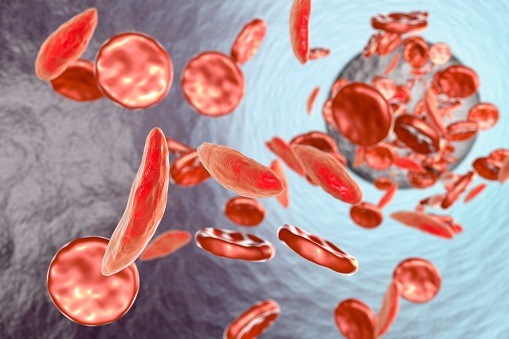
Check out the latest news from the 24th Congress of the European Hematology Association.
Targeting NADK Holds Promise in Treating NOTCH1-Driven T-Cell Acute Lymphoblastic Leukemia
Research presented at the 24th Congress of the European Hematology Association (EHA) found that potent inhibitors of NADK (NAD Kinase) could potentially enhance the treatment of T-cell acute lymphoblastic leukemia (T-ALL) while reducing side-effects as well. These findings were presented by Dr. Etienne De Braekeleer at the conference on June 15, and were published in the journal Blood.
Presenting in roughly one out of every 2,000 children by the age of 15, ALL is the most common pediatric cancer. Current combination chemotherapies have significantly improved patient outcomes, but these treatments are toxic and come with long-term health consequences. In addition, the overall incidence of ALL has been increasing over the past 30 years.
EHA: Addition of Daratumumab to Standard of Care Improves Response in Newly Diagnosed Myeloma
Research presented at the European Hematology Association 24th Congress found that the addition of daratumumab to bortezomib, thalidomide, and dexamethasone significantly improved responses without impacting safety in patients with newly diagnosed multiple myeloma (MM) who are eligible for autologous hematopoietic cell transplantation. The results of the study were also published in The Lancet.
The two-part, randomized, open-label, phase III CASSIOPEIA trial recruited 1,085 transplant-eligible patients with newly diagnosed MM from 111 European sites between September 22, 2015, and August 1, 2017. Patients were randomized 1:1 to receive four pre-transplant induction and two post-transplant consolidation cycles of bortezomib, thalidomide, and dexamethasone alone (VTd; n=542) or VTd in combination with daratumumab (D-VTd; n=543).
Voxelotor for Sickle Cell Disease Has Disease-Modifying Potential
Research presented at the European Hematology Association 24th Congress found that voxelotor significantly increased hemoglobin levels and reduced markers of hemolysis in patients with sickle cell disease(SCD). The novel drug targets the core mechanisms behind SCD, and the findings “indicate a disease-modifying potential,” the authors noted. The results of the study were also published in The New England Journal of Medicine.
Voxelotor is a first-in-class, once-daily, oral hemoglobin-oxygen affinity modulator that targets red cell polymerization, the hemolytic anemia that can lead to chronic organ damage, stroke, and premature death.
Study Finds Gene Therapy Effective in Treating Thalassemia
he 24th Congress of European Hematology Association (EHA) in Amsterdam found gene therapy to be effective in treating animal models of thalassemia. By targeting genes associated with iron regulation and erythropoiesis, or the production of red blood cells, they were able to successfully dampen the symptoms of the blood disorder. These findings were presented by Dr. Antonella Nai of the San Raffaele Scientific Institute in Milan, Italy.
Beta-thalassemia is an inherited disorder that causes impaired erythropoiesis, anemia, excessive iron concentrations, and enlargement of the spleen. It is caused by a mutation in the beta-globin chain of the adult hemoglobin molecule. To manage this disease, patients must undergo lifelong blood transfusions and iron chelation, or removal of excess iron from the blood. Bone marrow transplants have shown success in a few patients with viable donors; however, no treatment has been effective for all patients. Experimental approaches to treating thalassemia include gene therapy and drugs that target abnormal red blood cell production or the iron overload.
Success of Venetoclax and Obinutuzumab Use in Patients with CLL
Research presented by Dr. Kirsten Fischer at the 24th Congress of European Hematology Association (EHA) in Amsterdam on June 14 shows the efficacy of venetoclax (VENCLEXTA) and obinutuzumab (GAZYVA) in treating patients with chronic lymphocytic leukemia (CLL). This work supports the use of such treatment as a first-line therapy in patients with CLL and co-existing conditions.
Venetoclax is a selective inhibitor of BCL2, a protein responsible for regulating cell death that is overexpressed in CLL cells. By inhibiting this protein, venetoclax functions to rapidly induce apoptosis in these malignant cells. Obinutuzumab is an anti-CD20 monoclonal antibody that can bind and destroy CLL cells.
Study Finds Women With Rare Bone Marrow Cancer Can Still Have Safe Childbirth
A new study presented by Dr. Ekaterina Chelysheva at the 24th Congress of European Hematology Association (EHA) in Amsterdam on June 14 has found that normal and healthy childbirth is very possible for women with a rare cancer of the bone marrow. This cancer, chronic myeloid leukemia (CML), affects the white blood cells and accounts for 15% of all leukemias. Though it is expected to affect nearly 9,000 people this year in the U.S. and kill over a thousand, this recent research suggests that pregnant women can still safely deliver babies with the condition.
Planning the birth of a child presents a difficult challenge for women with CML. With new pharmaceutical therapies like tyrosine kinase inhibitors (TKIs), these patients can live out a typical lifespan. Being that little information is available regarding the outcomes of pregnancy in these CML patients, a group of researchers decided to evaluate this relationship.







 © 2025 Mashup Media, LLC, a Formedics Property. All Rights Reserved.
© 2025 Mashup Media, LLC, a Formedics Property. All Rights Reserved.